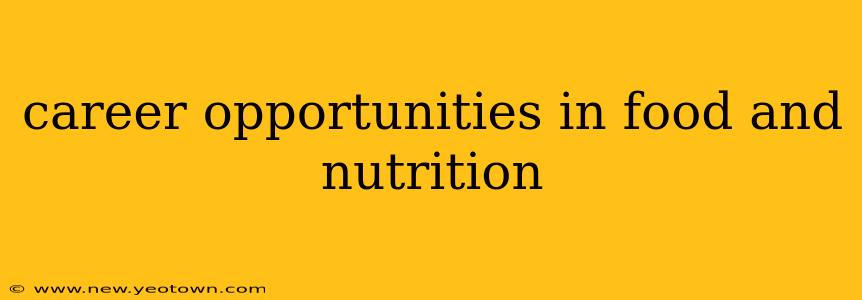The aroma of freshly baked bread, the vibrant colors of a farmers market, the satisfaction of helping someone improve their health – these are just a few of the things that make a career in food and nutrition so appealing. But beyond the delicious imagery, lies a vast and diverse landscape of career opportunities, catering to a wide range of interests and skill sets. This isn't just about cooking; it's about science, business, advocacy, and community impact. Let's explore the tantalizing possibilities.
What are the different career paths in food and nutrition?
This is a question often asked by those considering this field. The answer is multifaceted. You might find yourself in a lab conducting research, working in a hospital providing dietary advice, or even running your own successful food blog! The possibilities are as diverse as the ingredients in a gourmet dish.
What is the scope of food and nutrition jobs?
The scope is incredibly broad and constantly evolving. The growing awareness of the link between diet and overall health, coupled with increasing concerns about food sustainability and food security, has created a huge demand for skilled professionals in this field. This demand spans across various sectors, both in the public and private spheres.
What are some of the best careers in food and nutrition?
Let's delve into some specific career paths, highlighting their unique aspects and required qualifications:
Registered Dietitian (RD) or Registered Dietitian Nutritionist (RDN)
This is arguably the most well-known career path in food and nutrition. RDs/RDNs are healthcare professionals who are experts in food, nutrition, and dietetics. They assess, diagnose, and treat individuals with medical conditions related to nutrition. They work in hospitals, clinics, private practices, and even schools, providing personalized dietary plans and educating patients and their families. Becoming an RD/RDN requires completing an accredited academic program, supervised practice hours, and passing a national exam.
Food Scientist
If you're passionate about the science behind food production, a career as a food scientist could be perfect. Food scientists work in laboratories, researching and developing new food products, improving existing ones, and ensuring food safety and quality. They're involved in everything from recipe development to shelf-life studies and sensory evaluation. A background in food science, chemistry, or biology is usually required.
Culinary Nutritionist
This exciting career path blends the art of cooking with the science of nutrition. Culinary nutritionists create delicious and healthy meals, often focusing on specific dietary needs or preferences. They may work in restaurants, catering companies, hospitals, or wellness centers. They possess a deep understanding of both culinary techniques and nutritional principles.
Public Health Nutritionist
Public health nutritionists play a crucial role in improving community health through nutrition programs and initiatives. They work with government agencies, non-profit organizations, and community groups to develop and implement strategies to promote healthy eating habits and address food insecurity. They often work with vulnerable populations, such as children, the elderly, and low-income communities. This work often involves education and advocacy.
Food Writer or Blogger
For those with a flair for writing and a passion for food, a career as a food writer or blogger can be incredibly rewarding. You can share your culinary knowledge and expertise with a wider audience, inspiring others to adopt healthy eating habits and explore new flavors. Building a strong online presence and excellent writing skills are crucial for success.
Nutrition Consultant
Nutrition consultants work directly with individuals, providing personalized dietary guidance and support. They may specialize in areas like weight management, sports nutrition, or specific health conditions. They often work independently, requiring strong business acumen in addition to nutritional expertise.
What education is needed for a career in food and nutrition?
The educational path varies depending on the specific career you choose. However, most roles require at least a bachelor's degree in a related field like nutrition, food science, dietetics, or culinary arts. Further education, such as a master's degree or doctorate, can open doors to more specialized and advanced roles, such as research or academia.
What skills are important for a career in food and nutrition?
Beyond formal education, several essential skills are crucial for success in this field:
- Strong communication skills: Clearly explaining complex nutritional information to diverse audiences is paramount.
- Analytical skills: Analyzing dietary intake, interpreting research findings, and problem-solving are crucial.
- Organizational skills: Managing multiple projects, meeting deadlines, and maintaining meticulous records are essential.
- Interpersonal skills: Building rapport with clients or patients, collaborating with colleagues, and working effectively in teams are important.
- Creativity (for some roles): Developing new recipes, designing engaging educational materials, and presenting innovative solutions require creativity.
The world of food and nutrition is vibrant, dynamic, and brimming with opportunities. With the right education, skills, and passion, you can find a rewarding career that nourishes both your soul and your future.

